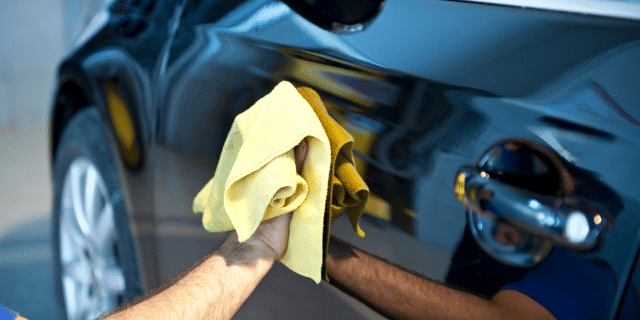You take pride in your car’s appearance—shiny, clean, and polished to perfection. But even the most careful car owner can fall victim to everyday threats that silently sabotage that showroom sparkle. From spilled coffee to sunbaked bird droppings, the dangers are everywhere. Here’s what to watch out for—and how to fight back.
1. Parking Under Trees
Shady spots might seem like a great way to beat the heat, but trees come with risks. Sticky sap, falling branches and twigs, and even acorns can wreak havoc on your paint. Sap is especially stubborn—it bonds with the surface and can damage the finish over time. Use a bug and tar remover from your local auto store to gently lift it off.
2. Bird Droppings
Think of bird droppings as acid bombs for your paint job. They harden in the sun and can etch into your car’s finish if left too long. Wipe them off with a wet microfiber cloth using a gentle lifting motion (don’t scrub!). You can let the cleaner sit for a few minutes if needed to soften hardened spots.
3. Bug Splatter
Bugs on the windshield are just an annoyance. But bugs on your paint? That’s a problem. Many insects contain acidic compounds that can damage your finish. Clean them off ASAP with a dedicated bug remover or mild soap and water.
4. Fuel Spills
Fuel stains are more than ugly—they’re damaging. Gasoline can eat away at your paint and leave behind stubborn marks. Avoid topping off the tank to help prevent the chance of spills. If there’s a spill, clean it up immediately. Pro tip: Older brake fluid is also a known paint-stripper, so be extra careful when topping off your fluids.
5. Road Salt
Winter driving means road salt—and that means potential rust. Salt can corrode your car’s underbody and eat away at the paint if left unwashed. Rinse your car regularly in the winter and consider a protective wax coat before the first snowfall. Coastal drivers, take note: salty ocean air can do the same.
6. Writing in the Dust
We get it—drawing “Wash Me” on a dusty car is tempting. But those dust particles? They’re basically sandpaper. Dragging them across the surface can create micro-scratches. Dust mixed with rainwater can also become acidic, further damaging your finish. When you see dust, that’s a great time to run your vehicle through a car wash.
7. Dirty Sponges & Harsh Car Washes
Washing your car with a dirty sponge just grinds more grime into the paint. Stick to clean microfiber cloths, and avoid old-style brush car washes, which can leave swirl marks. Soft-cloth or touchless car washes are safer choices.
8. Coffee and Soda Spills
Placing your cup on the roof while fumbling for keys? We’ve all done it. But if you spill sugary or acidic drinks, they can stain your paint fast. Wipe off any spills immediately, especially soda and coffee.
9. Silly String & Shaving Cream Pranks
They might seem harmless, but Silly String contains resins and dyes that can bond to your paint, and shaving cream can leave behind lasting stains. If your car becomes the victim of a prank, rinse and wash it thoroughly as soon as possible.
10. Sprinkler Water Spots
Those white spots you see after a sprinkler hits your car? That’s mineral buildup from hard water, and over time, it can wear away your clear coat. Always dry your car with a microfiber towel—don’t let it drip dry.
Protect Your Paint Like a Pro
You can take steps year-round to protect your paint, and help it last longer.
- Park in a garage or covered area whenever possible.
- Wash your car regularly, especially after road trips or storms.
- Dry it completely with a microfiber towel to avoid water spots.
- Remove bird droppings, sap, and bugs as soon as you spot them.
- Wax your car every 3 to 6 months to maintain a protective barrier.
Your car is one of your biggest investments. Protect it with the right insurance for added peace of mind.
This article is furnished by California Casualty, providing auto and home insurance to educators, law enforcement officers, firefighters, and nurses. Get a quote at 1.866.704.8614 or www.calcas.com.
- Surprising Careers for EMTs - February 27, 2026
- How to Properly Pack Your Fridge - February 24, 2026
- Staying in Control with Driver Assist - February 13, 2026

